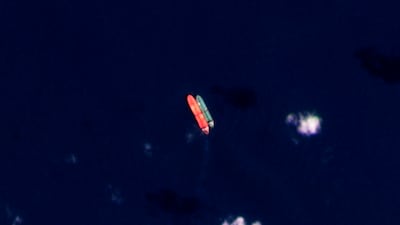A Greek shipping company has admitted smuggling sanctioned Iranian crude oil and agreed to pay a $2.4 million fine, US court documents unsealed on Thursday showed.
The case against Empire Navigation, which faces three years of probation under the plea agreement, marks the first public acknowledgement by US prosecutors that the US seized some one million barrels of oil from the tanker Suez Rajan.
The saga surrounding the ship escalated tensions between the US and Iran even as they work towards a trade of billions of dollars in frozen Iranian assets in South Korea for the release of five Iranian-American dual citizens held in Tehran.
The Suez Rajan, previously owned by California-based Oaktree Capital Management, had been suspected of taking Iranian oil that was under sanctions to a client in Asia in a 2022 investigation by the campaign group United Against a Nuclear Iran.
Oaktree, which has repeatedly declined to discuss the case, sold the vessel fully to Empire in late May.
The vessel was unable to unload its cargo and sailed on towards the US, where it stayed for a period of time, possibly as authorities decided on a course of action.
The court filings also shed light on the covert world of Iranian crude oil smuggling in the face of western sanctions since the collapse of its 2015 nuclear deal – an operation that has only grown in scale this year.
The US and its allies have been seizing Iranian oil cargos since 2019.
That has led to a series of attacks in the Middle East attributed to Iran, as well as ship seizures by Iranian military and paramilitary forces that threaten global shipping through the Strait of Hormuz, the narrow mouth of the Arabian Gulf through which 20 per cent of the world's oil passes.
The unsealed court papers relied on satellite images, as well as documents, to show that the Suez Rajan sought to mask its loading of Iranian crude oil from one tanker by trying to claim it came from another tanker.
For months, the ship sat in the South China Sea off the north-east coast of Singapore before suddenly sailing for the Texas coast without explanation.
The vessel discharged its cargo to another tanker, which released its oil in Houston in recent days. The court documents seen by AP on Thursday confirm the US government seized the oil.
A lawyer for Empire Navigation, Apostolos Tourkantonis, pleaded guilty on its behalf to a single charge of breaching the sanctions on Iran. Empire, based in Athens, did not immediately respond to a request for comment early on Thursday.
The US Treasury has said Iran’s oil smuggling revenue supports the Quds Force, the expeditionary unit of Iran's Islamic Revolutionary Guard Corps that operates across the Middle East.
The IRGC is suspected to be closely involved in the trade, involving hundreds of vessels that try to mask their movements and can hide their ownership through foreign shell companies.
But the Suez Rajan case was unique because it was owned by Oaktree Capital Management at the time of the transfer. That is likely to have given American prosecutors an edge in pursuing the case.
Since the Suez Rajan went to America, Iran has seized two tankers near the Strait of Hormuz, including one with cargo for the US oil company Chevron.
In July, the senior commander of the IRGC’s naval arm threatened further action against anyone offloading the Suez Rajan, with state media linking the recent seizures to the cargo’s fate.
Iran has continued to make threats over the seizure and summoned a Swiss diplomat in Tehran to express its anger. Switzerland has looked after US interests in Iran since the 1979 US embassy takeover and hostage crisis.

